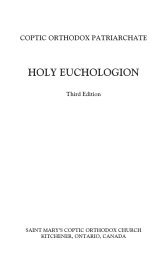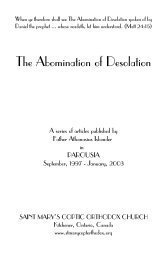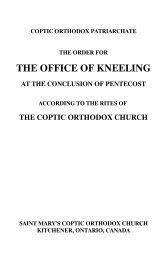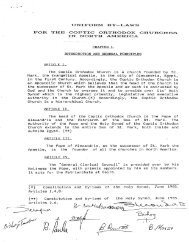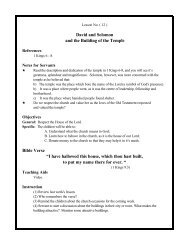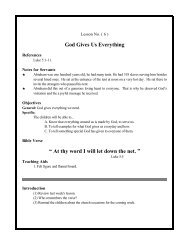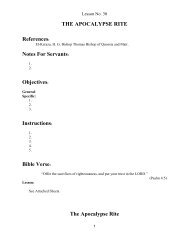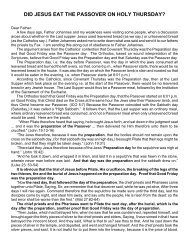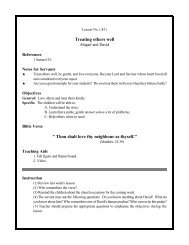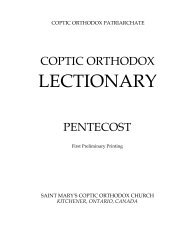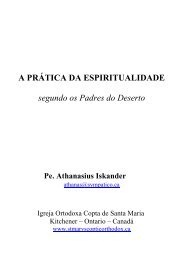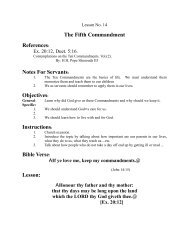Wars in the Old Testament - St. Marys Coptic Orthodox Church
Wars in the Old Testament - St. Marys Coptic Orthodox Church
Wars in the Old Testament - St. Marys Coptic Orthodox Church
Create successful ePaper yourself
Turn your PDF publications into a flip-book with our unique Google optimized e-Paper software.
<strong>Wars</strong> <strong>in</strong> <strong>the</strong> <strong>Old</strong> <strong>Testament</strong><br />
By: Rami Guirguis<br />
INTRODUCTION:<br />
The <strong>in</strong>cidence of war and violence found <strong>in</strong> <strong>the</strong> <strong>Old</strong> <strong>Testament</strong> are stumbl<strong>in</strong>g blocks for many<br />
Christians and non-Christians alike. How does a Christian layperson or a <strong>the</strong>ologian put God’s holy<br />
judgement on a s<strong>in</strong>ful society <strong>in</strong>to perspective? At first sight war and violence would appear to<br />
contradict <strong>the</strong> New <strong>Testament</strong> <strong>in</strong> which Christian “warfare” uses weapons of love and compassion.<br />
Do you enjoy watch<strong>in</strong>g action and war movies? Take for <strong>in</strong>stance, a group of young boys watch<strong>in</strong>g<br />
<strong>the</strong> film “Midway” on television. These children cheer when <strong>the</strong>y see <strong>the</strong> Americans destroy<br />
Japanese aircraft carriers. “Cool”, is <strong>the</strong> boys’ reaction to <strong>the</strong> destruction of lives aboard <strong>the</strong>se<br />
aircraft carriers, whe<strong>the</strong>r <strong>the</strong>y understand or not. This example is analogous to a scene <strong>in</strong> C.S.<br />
Lewis’s book “Screwtape Letters”. Wormwood, a junior devil is “delirious with joy” because <strong>the</strong><br />
“European humans” have commenced ano<strong>the</strong>r one of <strong>the</strong>ir wars, namely WWII. For <strong>the</strong> devil war is<br />
his reward; it is his enterta<strong>in</strong>ment. Separation from God is anguish and bewilderment that leads to<br />
<strong>the</strong> fragmentation of Life 1 , which ultimately leads to war and violence. It is not a typical scenario <strong>in</strong><br />
which good guy kills bad guy, but ra<strong>the</strong>r a question of watch<strong>in</strong>g from an unrealistic viewpo<strong>in</strong>t <strong>the</strong><br />
loss of lives through acts of violence. Is that how we def<strong>in</strong>e enterta<strong>in</strong>ment? Some people may view<br />
my reaction as extreme.<br />
A friend of m<strong>in</strong>e once made this <strong>in</strong>terest<strong>in</strong>g comment. “There are people who will l<strong>in</strong>e up at<br />
<strong>the</strong>atres for hours to watch a movie like James Bond or Private Ryan. These movies set a new<br />
standard for gruesomeness. But little do <strong>the</strong>y realize that if <strong>the</strong>y were to become <strong>the</strong> victims of war<br />
and violence, it is no longer mere enterta<strong>in</strong>ment but a very harsh reality.” Of course <strong>the</strong> devil would<br />
f<strong>in</strong>d <strong>the</strong>se movies enterta<strong>in</strong><strong>in</strong>g. Indeed, as Screwtape <strong>the</strong> senior devil once said “The immediate<br />
fear and suffer<strong>in</strong>g of <strong>the</strong> humans is legitimate and a pleas<strong>in</strong>g refreshment for our myriads of toil<strong>in</strong>g<br />
workers.”<br />
As a contemporary Christian reader of <strong>the</strong> <strong>Old</strong> <strong>Testament</strong> <strong>the</strong> predom<strong>in</strong>ance of war has always<br />
troubled me a great deal. The conflict between war and religion was not reconciled <strong>in</strong> my m<strong>in</strong>d, until<br />
recently. For myself <strong>the</strong> problem of war <strong>in</strong> <strong>the</strong> <strong>Old</strong> <strong>Testament</strong> was not academic, but ra<strong>the</strong>r it was<br />
more related to my practice of Christian liv<strong>in</strong>g. I was unable to answer <strong>the</strong> question of why <strong>the</strong>re<br />
were wars <strong>in</strong> <strong>the</strong> <strong>Old</strong> <strong>Testament</strong>, and its relevance to Christianity. For a time when I was unable to<br />
answer <strong>the</strong>se questions, I began to feel a sense of moral frustration, and <strong>the</strong>ological anxiety. I am<br />
certa<strong>in</strong> that <strong>the</strong> moral problem of war troubles many Christians and non - Christians alike. For<br />
myself, it was disturb<strong>in</strong>g to read about <strong>the</strong> ruthless laws of war <strong>in</strong> Deuteronomy 20:10-18. In Joshua<br />
6:21, it is unsettl<strong>in</strong>g to read about <strong>the</strong> slaughter of “both man and women, young and old.”<br />
CRITICISM OF THE CHRISTIAN FAITH:<br />
The external problem of war <strong>in</strong> <strong>the</strong> <strong>Old</strong> <strong>Testament</strong> creates a platform for criticism and attacks on<br />
<strong>the</strong> Christian Faith. Take for <strong>in</strong>stance, Madalyn Murray O’Hair, a representative of a<strong>the</strong>ism from <strong>the</strong><br />
United <strong>St</strong>ates. O’Hair attended a <strong>the</strong>ological discussion held at <strong>the</strong> University of Calgary. Dur<strong>in</strong>g<br />
what became an <strong>in</strong>tensive debate she conveyed her thoughts about <strong>the</strong> <strong>Old</strong> <strong>Testament</strong>. Her<br />
comments were that she was “shocked and appalled” by <strong>the</strong> content of kill<strong>in</strong>g and brutality<br />
described <strong>in</strong> <strong>the</strong> <strong>Old</strong> <strong>Testament</strong>. Dr. Peter Craigie, a professor of <strong>Old</strong> <strong>Testament</strong> <strong>the</strong>ology<br />
commented that, “ her reaction was no doubt an honest one.” 2 Like myself, she failed to<br />
comprehend <strong>the</strong> <strong>the</strong>ological perspective of <strong>the</strong> <strong>Old</strong> <strong>Testament</strong> scriptures, which unfortunately<br />
contributed to her a<strong>the</strong>ism as well as her negative critique of Christianity.<br />
13
WAR – A THEORETICAL AND THEOLOGICAL DEFINITION:<br />
One of <strong>the</strong> most <strong>in</strong>fluential philosophers of war <strong>in</strong> modern times was <strong>the</strong> Prussian military<br />
<strong>the</strong>orist Carl Von Clausewitz (1780-1831). Clausewitz def<strong>in</strong>es war “as an act of violence undertaken<br />
<strong>in</strong> order to compel <strong>the</strong> enemy to fulfill <strong>the</strong> will of <strong>the</strong> aggressor.” I agree with this def<strong>in</strong>ition from a<br />
<strong>the</strong>oretical standpo<strong>in</strong>t. But what is <strong>the</strong> moral significance of war? 3 Craigie def<strong>in</strong>es war as <strong>the</strong><br />
engagement of evil and s<strong>in</strong>ful human activity, which reveal man’s <strong>in</strong>humanity to his fellow man. 4<br />
THE SPHERE OF HISTORY:<br />
When we read Deuteronomy 2:26-37, we are told about <strong>the</strong> Conquest of Heshbon. Let us<br />
exam<strong>in</strong>e verse 30 <strong>in</strong> detail.<br />
“But Sihon k<strong>in</strong>g of Heshbon would not let us pass by him: for <strong>the</strong> Lord thy God hardened his spirit, and<br />
made his heart obst<strong>in</strong>ate, that he might deliver him <strong>in</strong>to thy hand, as appeareth this day.”<br />
We should note that K<strong>in</strong>g Sihon’s confidence stems from his military successes aga<strong>in</strong>st <strong>the</strong><br />
Moabites. Why <strong>the</strong>n should he submit himself to <strong>the</strong> Israelites? Remember, K<strong>in</strong>g Sihon was<br />
stubborn and he was unwill<strong>in</strong>g to allow <strong>the</strong> Israelites to pass through. When we read this portion of<br />
<strong>the</strong> passage “for <strong>the</strong> Lord thy God hardened his spirit, and made his heart obst<strong>in</strong>ate, that he might<br />
deliver him <strong>in</strong>to thy hand, as appeareth this day.” One question comes to m<strong>in</strong>d: Does this literally<br />
mean that God caused Sihon’s m<strong>in</strong>d to refuse <strong>the</strong> Israelites passage? The answer is No. Accord<strong>in</strong>g<br />
to a scholarly study conducted by G.T. Manely this passage does not reflect determ<strong>in</strong>ism, but ra<strong>the</strong>r<br />
a part of <strong>the</strong> “Hebrew Theology of History” 5 . Humans are free and responsible <strong>in</strong> action, but <strong>the</strong><br />
actions of all people are set with<strong>in</strong> <strong>the</strong> “sphere of history” and God is <strong>the</strong> Lord of History. To<br />
elaborate fur<strong>the</strong>r with regards to this matter, C.K. Barrett, professor of <strong>Old</strong> <strong>Testament</strong> <strong>the</strong>ology,<br />
expla<strong>in</strong>s that history <strong>in</strong> Ancient Israel was not a “scientific discipl<strong>in</strong>e”. The acts of God <strong>in</strong> its very<br />
nature are “trans-historical” <strong>in</strong> relationship to a modern concept of history. Trans-historical is <strong>in</strong><br />
effect above our control of history. People control <strong>the</strong> outcomes of history, and are responsible for<br />
<strong>the</strong>ir actions. A philosopher named Dr. Karl Marx, expressed that “Man’s actions def<strong>in</strong>es history”,<br />
which means that history can <strong>in</strong> no possible way def<strong>in</strong>e our actions. 6 We <strong>in</strong>teract with our<br />
environment, which <strong>in</strong> effect determ<strong>in</strong>es our social status. Marx <strong>in</strong>dicates that <strong>the</strong> po<strong>in</strong>t is not just to<br />
<strong>in</strong>terpret history but also to change it. From a human perspective, I believe that history and change<br />
are essential to our existence. I certa<strong>in</strong>ly agree with Marx’s statement from a human philosophical<br />
standpo<strong>in</strong>t, however, <strong>the</strong>re are limitations to his <strong>the</strong>ory. What Marx fails to realize, as a nonreligious<br />
person is, that <strong>the</strong> acts of God <strong>in</strong> <strong>the</strong>ir very nature are trans-historical. Thus, <strong>the</strong> roles of<br />
history are controlled by our actions, but it is ultimately <strong>in</strong> God’s control. It is <strong>in</strong> effect God’s arena.<br />
How can we as contemporary Christians understand <strong>the</strong> association of war and violence <strong>in</strong> <strong>the</strong><br />
<strong>Old</strong> <strong>Testament</strong> with <strong>the</strong> lov<strong>in</strong>g and compassionate Jesus Christ? Initially, it may appear that <strong>the</strong>se<br />
two portraits of God are not reconcilable. How can we resolve this problem? Should we as<br />
Christians reject <strong>the</strong> <strong>Old</strong> <strong>Testament</strong>, and make <strong>the</strong> assumption that it is a “second class” revelation<br />
<strong>in</strong> contrast to <strong>the</strong> New <strong>Testament</strong>. Let us discuss this alternative by referr<strong>in</strong>g to <strong>the</strong> Christian<br />
<strong>the</strong>ologian C.E. Raven. In his book, “War and <strong>the</strong> Christian” he writes:<br />
“Until lately, <strong>the</strong> <strong>Old</strong> <strong>Testament</strong> stood along side <strong>the</strong> New <strong>Testament</strong> as <strong>in</strong>spired… Large parts of <strong>the</strong><br />
O.T. glorify <strong>the</strong> God of Battles ra<strong>the</strong>r than <strong>the</strong> Fa<strong>the</strong>r of our Lord Jesus Christ” 7<br />
C.E. Raven developed <strong>the</strong> notion that <strong>in</strong> order to ma<strong>in</strong>ta<strong>in</strong> a consistent position of God as be<strong>in</strong>g a<br />
k<strong>in</strong>d, lov<strong>in</strong>g and merciful God, he was forced to reject certa<strong>in</strong> aspects of <strong>the</strong> <strong>Old</strong> <strong>Testament</strong><br />
scriptures <strong>in</strong> which he associates God as a warlike, weak and cruel Creator. Consequently, <strong>the</strong>se<br />
false doctr<strong>in</strong>es caused C.E. Raven to eventually become an unorthodox <strong>the</strong>ologian. In addition, I<br />
would perceive that this sort of Christian practice creates a form of Gnosticism, and unfortunately<br />
14
C.E. Raven eventually became a heretic. Raven is an example of a person who could not reconcile<br />
<strong>the</strong> different portraits of God given <strong>in</strong> <strong>the</strong> <strong>Old</strong> <strong>Testament</strong> and New <strong>Testament</strong>. In o<strong>the</strong>r words, for<br />
Raven, <strong>the</strong> warlike description of God provided <strong>in</strong> <strong>the</strong> <strong>Old</strong> <strong>Testament</strong> is not compatible with <strong>the</strong><br />
description of God <strong>in</strong> <strong>the</strong> New <strong>Testament</strong>. Once aga<strong>in</strong> I will restate <strong>the</strong> question, should we reject<br />
<strong>the</strong> O.T. scriptures that refer to war and violence. The answer is obviously No! Why? The <strong>Old</strong><br />
<strong>Testament</strong> and New <strong>Testament</strong> is part of our Christian Bible, and it is simply a take it or leave it<br />
situation. Peter Craigie, professor of O.T. <strong>the</strong>ology put forth this conditional statement:<br />
“If <strong>the</strong> <strong>Old</strong> <strong>Testament</strong> was scripture for Jesus and <strong>the</strong> first Christians, let us not lay it aside too lightly,<br />
however, proper our appreciation of New <strong>Testament</strong> maybe.” 8<br />
NORMANDY:<br />
General Montgomery is a good example of a person who understood and diligently read both<br />
<strong>the</strong> <strong>Old</strong> <strong>Testament</strong> and <strong>the</strong> New <strong>Testament</strong>. Professor Robert Osborne of Carleton University<br />
provides this commentary of how Montgomery affirmed his Christian faith. The allied <strong>in</strong>vasion of<br />
Normandy on June 6, 1944 was <strong>the</strong> largest comb<strong>in</strong>ed military operation <strong>in</strong> <strong>the</strong> history of warfare<br />
<strong>in</strong>volv<strong>in</strong>g, <strong>the</strong> air, sea and land forces of Brita<strong>in</strong>, <strong>the</strong> Commonwealth, France and <strong>the</strong> United <strong>St</strong>ates.<br />
On <strong>the</strong> eve of this military campaign General Montgomery sent a message to his troops:<br />
“Let us pray that <strong>the</strong> Lord Mighty <strong>in</strong> Battle will go forth with our armies, and that His special providence<br />
will aid us <strong>in</strong> <strong>the</strong> struggle” 9<br />
General Montgomery was a soldier who associated God with war <strong>in</strong> <strong>the</strong> correct context.<br />
Montgomery did not have any difficulties understand<strong>in</strong>g <strong>the</strong>ologically <strong>the</strong> role of God as a Warrior <strong>in</strong><br />
<strong>the</strong> <strong>Old</strong> <strong>Testament</strong>. That is, it did not appear to be <strong>in</strong> conflict with his understand<strong>in</strong>g of Jesus Christ<br />
<strong>in</strong> <strong>the</strong> New <strong>Testament</strong> as it was for C.E. Raven. In <strong>the</strong> past “God <strong>the</strong> Warrior” as presented <strong>in</strong><br />
Exodus <strong>in</strong> The Song of Sea, had fought on behalf of His chosen people as <strong>the</strong> O.T. clearly affirms.<br />
“Then why should God not cont<strong>in</strong>ue to be known as <strong>the</strong> Warrior of <strong>the</strong> modern world?” 10<br />
MISUNDERSTANDING THE TEACHINGS<br />
OF THE OLD TESTAMENT:<br />
Accord<strong>in</strong>g to history <strong>the</strong> scriptures of <strong>the</strong> <strong>Old</strong> <strong>Testament</strong> <strong>in</strong>fluenced <strong>the</strong> First Crusades. How? In<br />
summer of July 15, 1099 <strong>the</strong> first Crusades captured and liberated Jerusalem from <strong>the</strong> Muslims.<br />
The Crusades considered Jerusalem <strong>the</strong> most sacred and beloved city <strong>in</strong> Christendom.<br />
Unfortunately, <strong>the</strong>ir victory was achieved by bloodshed, and dur<strong>in</strong>g this questionable period <strong>in</strong><br />
history 10,000 Muslims were massacred. At that time <strong>the</strong> chroniclers recount <strong>the</strong>se facts with “joy<br />
and applauded <strong>the</strong> justice that was done” all <strong>in</strong> name of Christianity.” On July 15, 1099 it was<br />
declared that <strong>the</strong>se expeditions were undertaken and justified <strong>in</strong> order to fulfill a promise to God<br />
directed aga<strong>in</strong>st all pagans, heretics, and Muslims. Simply stated <strong>the</strong> Crusaders felt “it was <strong>the</strong><br />
justification of all Christianity.” 11 Obviously, <strong>the</strong>y did not value <strong>the</strong> reverence for human life by<br />
committ<strong>in</strong>g <strong>the</strong>se savage acts of murder and brutality. What can we learn from this? It is important<br />
that <strong>the</strong> lessons of our history evoke a serious attempt to carefully and appropriately study <strong>the</strong> <strong>Old</strong><br />
<strong>Testament</strong>. Henceforth, we must understand <strong>the</strong> message of <strong>the</strong> whole bible,<br />
“beware of <strong>the</strong> danger of manipulat<strong>in</strong>g <strong>the</strong> O.T. scripture teach<strong>in</strong>gs to human ends.” 12<br />
CAUSES OF WAR – A THEOLOGICAL COMMENTARY:<br />
Let us exam<strong>in</strong>e <strong>the</strong> relationship between God and ourselves. A relationship beg<strong>in</strong>s with creation<br />
itself; we are created by God and placed <strong>in</strong> this world <strong>in</strong> order to develop and enjoy a relationship<br />
with Him. In Genesis man enjoyed this relationship with God before he was exiled from paradise.<br />
15
Our disobedience and rebellious acts aga<strong>in</strong>st God made us fall out of favour with Him. For <strong>in</strong>stance,<br />
<strong>the</strong> break<strong>in</strong>g of <strong>the</strong> covenant has its consequences as illustrated <strong>in</strong> <strong>the</strong> Mosaic Texts. This fall leads<br />
to <strong>the</strong> alienation from God. By virtue of be<strong>in</strong>g a creature of God, our lives are whole and complete<br />
whereas our separation from God leads to a fragmented life. This is <strong>the</strong> dilemma of our human<br />
condition, which is ultimately <strong>the</strong> <strong>the</strong>me of <strong>the</strong> <strong>Old</strong> <strong>Testament</strong>. In a complete relationship with God,<br />
peace is <strong>the</strong> primary and desirable human condition. What is <strong>the</strong> fragmented human condition? The<br />
answer is war and violence 13 , which <strong>in</strong>evitably leads to <strong>the</strong> alienation from God, and ultimately<br />
drives a wedge between people. By separat<strong>in</strong>g from God our human condition beg<strong>in</strong>s to worsen<br />
and we are left with no moral pathway to guide us.<br />
Dr. Peter Craigie, professor of O.T. Theology expresses it more succ<strong>in</strong>ctly:<br />
“Alienation from God resulted <strong>in</strong> <strong>the</strong> fragmentation of human life and <strong>the</strong>refore, contributed to conflict<br />
between men.” 14<br />
LIMITATIONS OF HUMAN LANGUAGE:<br />
First, we must address <strong>the</strong> <strong>the</strong>ological problem of God. In particular, we know that <strong>the</strong> dom<strong>in</strong>ant<br />
representations of God <strong>in</strong> <strong>the</strong> O.T. are “God is Warrior”, or “A Man <strong>in</strong> Battle” (The LORD is a man of<br />
war: Exodus 15:3) At first sight <strong>the</strong>se descriptions of God convey <strong>the</strong> image of a militant warlike<br />
God. Fur<strong>the</strong>rmore, <strong>the</strong>se descriptions appear to be out of context with <strong>the</strong> conception of a lov<strong>in</strong>g<br />
and merciful God <strong>in</strong> <strong>the</strong> New <strong>Testament</strong>. The phrase: “The Lord is a man of war” was at that time<br />
<strong>the</strong> nature of human language for <strong>the</strong> Israelites. 15 We already know that God operates with<strong>in</strong> a<br />
doma<strong>in</strong> of reality and that God is also transcendent, <strong>the</strong>refore, l<strong>in</strong>guistic construction tend to be<br />
limit<strong>in</strong>g. In essence, “God exceeds <strong>the</strong> limitation of human language.” Dr. Peter Craigie wrote:<br />
“Words such as “warrior” and “armies” po<strong>in</strong>t to <strong>the</strong> realities of human existence and human history.<br />
When <strong>the</strong> words are used of God, <strong>the</strong>y po<strong>in</strong>t to his <strong>in</strong>volvement <strong>in</strong> that existence and history. God is<br />
Warrior, or ra<strong>the</strong>r to translate it means God participates actively <strong>in</strong> <strong>the</strong> human <strong>in</strong>stitution of warfare.” 16<br />
THE PROBLEM OF ETHICS:<br />
What we must understand is that God is <strong>the</strong> giver of all life; and God has <strong>the</strong> absolute and only<br />
authority to withdraw life or command war <strong>in</strong> which human life will be withdrawn. Dr. Peter Craigie<br />
illustrates this fact by rem<strong>in</strong>d<strong>in</strong>g us that Ancient Israel could only be justified by <strong>the</strong> div<strong>in</strong>e command<br />
of God. The right to give or take lives perta<strong>in</strong>s only to God. The world <strong>in</strong> that period of history was<br />
as it is; now <strong>the</strong> world of s<strong>in</strong>ful men engaged <strong>in</strong> s<strong>in</strong>ful activities. 17 This basic truth of <strong>the</strong> human<br />
condition is necessary to understand<strong>in</strong>g war. Ironically, <strong>the</strong> participation of God through evil human<br />
activities has a positive end <strong>in</strong> view (i.e. <strong>the</strong> justified retribution from God.) Specifically, <strong>the</strong> f<strong>in</strong>al<br />
judgement of God <strong>in</strong> <strong>the</strong> larger perspective is <strong>the</strong> mercy of God. With<strong>in</strong> <strong>the</strong> providence of God war<br />
was justified to execute <strong>the</strong> div<strong>in</strong>e judgement on <strong>the</strong> people of <strong>the</strong> world who are said to have been<br />
s<strong>in</strong>ful beyond redemption.<br />
God’s participation <strong>in</strong> <strong>the</strong> wars of <strong>the</strong> Israelite conquests was a means of execut<strong>in</strong>g div<strong>in</strong>e<br />
judgement on evil nations. Conversely, God also provides foreign nations victorious warfare <strong>in</strong> <strong>the</strong><br />
execution of his judgement upon his own chosen people. One example of this can be found <strong>in</strong><br />
Deuteronomy 28:25:<br />
“The LORD shall cause <strong>the</strong>e to be smitten before th<strong>in</strong>e enemies: thou shalt go out one way aga<strong>in</strong>st<br />
<strong>the</strong>m, and flee seven ways before <strong>the</strong>m: and shalt be removed <strong>in</strong>to all <strong>the</strong> k<strong>in</strong>gdoms of <strong>the</strong> earth.”<br />
Once aga<strong>in</strong> God has participated <strong>in</strong> warfare towards <strong>the</strong> ends of both judgment and redemption.<br />
The O.T. scriptures provide references to God judg<strong>in</strong>g <strong>the</strong> evil of <strong>the</strong> Canaanites. The div<strong>in</strong>e<br />
judgement of God was affirmed <strong>in</strong> <strong>the</strong> defeat of Judah and <strong>the</strong> fall of Jerusalem. Indeed, God is also<br />
just with his own people who were chosen as <strong>the</strong> religiously conceived nation. The people of<br />
16
Ancient Israel were punished for <strong>the</strong>ir evil and disobedience. God’s <strong>in</strong>tervention <strong>in</strong> human history,<br />
specifically <strong>the</strong> history of warfare, <strong>in</strong> terms of judgment and redemption, po<strong>in</strong>ts to a larger truth: <strong>the</strong><br />
concern with <strong>the</strong> providence of God.<br />
IS GOD MERCIFUL?<br />
Some people conclude that <strong>the</strong> Lord suddenly descended on <strong>the</strong> Canaanite people without<br />
warn<strong>in</strong>g and destroyed <strong>the</strong>m. This is not so! In Joshua chapter 6 we are told that God gave <strong>the</strong><br />
people of Jericho seven more days to turn from <strong>the</strong>ir s<strong>in</strong>s. God sent <strong>the</strong> M<strong>in</strong>or Prophets to warn <strong>the</strong><br />
people of Edom to change <strong>the</strong>ir evil ways. Even <strong>the</strong> people of Sodom and Gomorrah were not<br />
condemned until <strong>the</strong>y were warned numerous times that God was go<strong>in</strong>g to destroy <strong>the</strong>m because of<br />
<strong>the</strong>ir <strong>in</strong>fidelity, and idolatry. To fur<strong>the</strong>r illustrate <strong>the</strong> evidence of God’s mercy, consider <strong>the</strong> book of<br />
Jonah. One can appreciate <strong>the</strong> story of Jonah because it describes <strong>the</strong> limitations of our own f<strong>in</strong>ite<br />
understand<strong>in</strong>g of morality. By read<strong>in</strong>g <strong>the</strong> story of Jonah we know that Jonah rebels aga<strong>in</strong>st God’s<br />
div<strong>in</strong>e revelation. Jonah not only disobeys Yahweh, he also attempts to flee from His presence. As<br />
Fa<strong>the</strong>r Mapple’s Sermon expresses <strong>in</strong> <strong>the</strong> novel Moby Dick by Herman Melville “He th<strong>in</strong>ks that a<br />
ship made by men, will carry him <strong>in</strong>to countries where God does not reign but only <strong>the</strong> Capta<strong>in</strong>s of<br />
this earth. See ye not <strong>the</strong>n, shipmates, that Jonah sought to flee worldwide from God? Miserable<br />
man! As with all s<strong>in</strong>ners among men, <strong>the</strong> s<strong>in</strong> of this son of Amittai was <strong>in</strong> his wilful disobedience of<br />
<strong>the</strong> command of God.” 20<br />
Jonah was aga<strong>in</strong>st <strong>the</strong> N<strong>in</strong>evites, a race of people who are known to be barbaric and cruel, and<br />
he questioned why God should show mercy and compassion for such a race of people? The<br />
challenge for Jonah was great <strong>in</strong>deed, for as Fa<strong>the</strong>r Mapple expla<strong>in</strong>s<br />
“never m<strong>in</strong>d now what that command was, or how conveyed- which he found a hard command. But all<br />
<strong>the</strong> th<strong>in</strong>gs that God would have us do are hard for us to do- remember that- and hence, he oftener<br />
commands us than endeavours to persuade. And if we obey God, we must disobey ourselves; and it<br />
is <strong>in</strong> this disobey<strong>in</strong>g ourselves, where<strong>in</strong> <strong>the</strong> hardness of obey<strong>in</strong>g God consists.” 21<br />
We must understand that where God is concerned <strong>the</strong>re are no limits and boundaries to His div<strong>in</strong>e<br />
grace. Jonah was not comfortable with <strong>the</strong> fact that Yahweh was show<strong>in</strong>g mercy and patience<br />
towards a nation that was violent and barbaric. Jonah made <strong>the</strong> conclusion that N<strong>in</strong>eveh should be<br />
destroyed, but Yahweh had not. No sooner does <strong>the</strong> question arises, what right do we have to be<br />
angry at God’s decision to spare N<strong>in</strong>eveh? The answer is that we have no right! Jonah is <strong>the</strong> story<br />
about a prophet who learned <strong>the</strong> difficult lesson that God has <strong>the</strong> absolute right to show<br />
compassion to those whom we might th<strong>in</strong>k do not deserve it. Our God has revealed Himself<br />
decisively; to be <strong>the</strong> God of compassion and forgiveness, not just toward us but also toward o<strong>the</strong>rs<br />
who we might believe do not deserve it.<br />
There were times when I read about wars <strong>in</strong> <strong>the</strong> <strong>Old</strong> <strong>Testament</strong> and often <strong>in</strong>terpreted it as<br />
perhaps a narrow and vengeful reaction from God directed towards an emotionally weak and<br />
misguided people. However, I realized that my misunderstand<strong>in</strong>gs emanate from a narrow view of<br />
<strong>the</strong> <strong>Old</strong> <strong>Testament</strong>, which does not consider <strong>the</strong> wider context of God’s providence. By exam<strong>in</strong><strong>in</strong>g<br />
previous prophecies from <strong>the</strong> M<strong>in</strong>or Prophets such as Amos, Isaiah, Jeremiah, Ezekiel, and Malachi<br />
I understand that God is offer<strong>in</strong>g us a number chances to fully cleanse ourselves from s<strong>in</strong>. The <strong>Old</strong><br />
<strong>Testament</strong> scriptures tell me that God on numerous occasions provided His people <strong>the</strong><br />
encouragement and opportunities to repent and redeem <strong>the</strong>mselves. Unfortunately, <strong>the</strong> people of<br />
Heshbon, Edom, <strong>the</strong> Canaanites, and <strong>the</strong> people of Jericho refused to heed <strong>the</strong> call of repentance.<br />
ADVOCATES OF PEACE;<br />
LESSONS LEARNED FROM THE OLD AND NEW TESTAMENTS:<br />
Dr. Craigie wrote:<br />
17
“But <strong>the</strong> establishment of <strong>the</strong> K<strong>in</strong>gdom of God <strong>in</strong> <strong>the</strong> person of Jesus reveals to us a new<br />
understand<strong>in</strong>g of violence; <strong>the</strong> tables are turned. Whereas <strong>the</strong> old k<strong>in</strong>gdom was established by <strong>the</strong><br />
use of violence, <strong>the</strong> new K<strong>in</strong>gdom was established <strong>in</strong> <strong>the</strong> receipt of violence. Over and Over aga<strong>in</strong>,<br />
Christians have forgotten that God <strong>the</strong> Warrior becomes <strong>the</strong> crucified God, <strong>the</strong> one who receives <strong>the</strong><br />
full force of human violence.” 18<br />
Dr. Craigie is referr<strong>in</strong>g to <strong>the</strong> suffer<strong>in</strong>g and death of Jesus Christ on <strong>the</strong> cross. In <strong>the</strong> O.T. <strong>the</strong><br />
manifestation of <strong>the</strong> K<strong>in</strong>gdom of God was revealed to <strong>the</strong> nation of Ancient Israel. But <strong>the</strong> new<br />
covenant establishes a completely different conception of <strong>the</strong> K<strong>in</strong>gdom of God. The K<strong>in</strong>gdom of<br />
God has no boundaries or limits, but ra<strong>the</strong>r God’s revelation exists <strong>in</strong> <strong>the</strong> person of Jesus to all<br />
nations of our world. Christ transcends violence and teaches us that it is obsolete.<br />
Professor G.H. Gilbert suggests:<br />
“The peace of <strong>the</strong> Golden Age was not thought to spr<strong>in</strong>g out of commercial and economic pr<strong>in</strong>ciples,<br />
nor from <strong>the</strong> circumstances of <strong>in</strong>ternational affairs. It was not conceived of or desired as <strong>the</strong><br />
handmaiden of civilization, but it was Yahweh’s gift first to his nation (i.e. Israel) and through <strong>the</strong>m to<br />
<strong>the</strong> World.” 19<br />
Reverend Mart<strong>in</strong> Lu<strong>the</strong>r K<strong>in</strong>g and Ghandi are recognized <strong>in</strong> our history as very courageous men<br />
who advocated peace. They both believed that non-violence was <strong>the</strong> only road to freedom and<br />
peaceful co-existence among people.<br />
Dur<strong>in</strong>g a very challeng<strong>in</strong>g period <strong>in</strong> American history, <strong>the</strong> year 1966 brought about many riots <strong>in</strong><br />
<strong>the</strong> ghettos of North Chicago. There was even some discussion about achiev<strong>in</strong>g political <strong>in</strong>fluence<br />
through violent and terrorist activity. “How should <strong>the</strong> Black Population be heard? Should <strong>the</strong><br />
Negroes Fight Back? heralded <strong>the</strong> nation’s press. 22 In order to quickly defend civil rights <strong>the</strong>re were<br />
discussions about us<strong>in</strong>g strident military retaliations, self-defence and Black Power with<strong>in</strong> <strong>the</strong><br />
United <strong>St</strong>ates. Dur<strong>in</strong>g <strong>the</strong>se harsh and bitter moments Mart<strong>in</strong> Lu<strong>the</strong>r K<strong>in</strong>g expressed his Christian<br />
philosophy aga<strong>in</strong>st hatred and violence:<br />
“Always be sure that you struggle with Christian methods. Never let Satan make you succumb to <strong>the</strong><br />
temptation of becom<strong>in</strong>g bitter. Let no one and/or Satan pull you so low as to hate your fellow man. In<br />
your struggle for justice, let your oppressor know that you are not attempt<strong>in</strong>g to defeat or humiliate<br />
him, or even pay him back for <strong>the</strong> <strong>in</strong>justices that he heaped upon you. Instead, let him know that you<br />
are seek<strong>in</strong>g justice for him as well as for yourself. I th<strong>in</strong>k I have discovered <strong>the</strong> highest good. It is<br />
Love. As <strong>St</strong>. John proclaims “God is Love”. He who loves is a participant <strong>in</strong> <strong>the</strong> be<strong>in</strong>g of God. He who<br />
hates does not know God. I am conv<strong>in</strong>ced that for practical reasons as well as moral reasons, nonviolence<br />
offers <strong>the</strong> only road to freedom for my people. In violent warfare, one must be prepared to<br />
face ruthlessly <strong>the</strong> fact <strong>the</strong>re will be causalities by <strong>the</strong> thousands. In Vietnam, (K<strong>in</strong>g writes) <strong>the</strong> United<br />
<strong>St</strong>ates has evidently decided that is will<strong>in</strong>g to slaughter millions, and sacrifice some 200,000 men to<br />
secure <strong>the</strong> freedom of <strong>the</strong> Vietnamese. Violence as a strategy for social change is obsolete.” 23<br />
The death of Jesus Christ, which is <strong>the</strong> death of God Incarnate, has demonstrated that <strong>in</strong> order<br />
to transcend violence Jesus had to receive violence or become a victim of violence, ra<strong>the</strong>r than use<br />
it on o<strong>the</strong>rs. It is evident that Mart<strong>in</strong> Lu<strong>the</strong>r K<strong>in</strong>g followed this similar pattern as a social prophet of<br />
his time. In 1955 his home was bombed, and <strong>in</strong> 1961 he was imprisoned <strong>in</strong> <strong>the</strong> Birm<strong>in</strong>gham Jail cell<br />
after be<strong>in</strong>g charged for illegal street demonstrations. F<strong>in</strong>ally on April 4, 1968 he was assass<strong>in</strong>ated<br />
at <strong>the</strong> Lora<strong>in</strong>e Motel <strong>in</strong> Memphis, Tennessee. As courageous and relentless as he was before his<br />
death, K<strong>in</strong>g still <strong>in</strong>sisted that only a refusal to hate and kill can put a forcible end to <strong>the</strong> claim of<br />
violence <strong>in</strong> <strong>the</strong> world, and <strong>in</strong>stead lead us toward a community of God where people can live without<br />
fear.<br />
18
FOOTNOTES:<br />
The problem of War <strong>in</strong> <strong>the</strong> <strong>Old</strong> <strong>Testament</strong>, Peter Craigie, (William B. Eerdmans Publish<strong>in</strong>g<br />
Company Grand Rapids, Michigan, 1978) p. 86-87.<br />
Pr<strong>in</strong>ciples on War, Clausewitz, Carl von. (Harmondsworth: Pengu<strong>in</strong> Books, 1968), p.52.<br />
The problem of War <strong>in</strong> <strong>the</strong> <strong>Old</strong> <strong>Testament</strong>, Peter Craigie, William B. Eerdmans Publish<strong>in</strong>g<br />
Company Grand Rapids, Michigan, p. 13.<br />
Ibid pp. 51<br />
The Book of Deuteronomy, Peter Craigie (William B. Eerdmans Publish<strong>in</strong>g Company Grand<br />
Rapids, Michigan, 1976) p. 114.<br />
Karl Marx and Frederick Engels Selected Works <strong>in</strong> three volumes, Volume 1., Karl Marx<br />
and Frederick Engels (Progress Publishers, Moscow, 1969. First Published <strong>in</strong> 1848),<br />
p. 15.<br />
War and <strong>the</strong> Christian, C.E. Raven (London Press, 1938), p.51<br />
The problem of War <strong>in</strong> <strong>the</strong> <strong>Old</strong> <strong>Testament</strong>, Peter Craigie, (William B. Eerdmans Publish<strong>in</strong>g<br />
Company Grand Rapids, Michigan, 1978) p. 34.<br />
The Soldiers Prayers, is quoted from H. Essame, Patton: a <strong>St</strong>udy <strong>in</strong> Command (New York:<br />
Charles Scribner’s 1974), p. 253.<br />
The problem of War <strong>in</strong> <strong>the</strong> <strong>Old</strong> <strong>Testament</strong>, Peter Craigie, (William B. Eerdmans Publish<strong>in</strong>g<br />
Company Grand Rapids, Michigan, 1978) p. 34.<br />
Ibid. p. 28<br />
Ibid. p. 29<br />
Ibid p. 86<br />
Ibid p. 86-87<br />
Ibid p. 94<br />
Ibid p. 95<br />
Ibid p. 102<br />
Ibid p. 100<br />
The Bible and Universal Peace, G.H. Gilbert (New York: Funk and Wagnalls, 1914.), p.81.<br />
Moby Dick, Herman Melville, (Alfred A. Knopf, Inc. written <strong>in</strong>1845), p.63.<br />
Ibid. p. 64.<br />
A <strong>Testament</strong> of Hope: The essential writ<strong>in</strong>gs and speeches of Mart<strong>in</strong> Lu<strong>the</strong>r K<strong>in</strong>g, Jr,<br />
Editied by James M. Wash<strong>in</strong>gton, (Harper Coll<strong>in</strong>s Publishers, 1986.) p. 54-55.<br />
Ibid. p. 74.<br />
19



